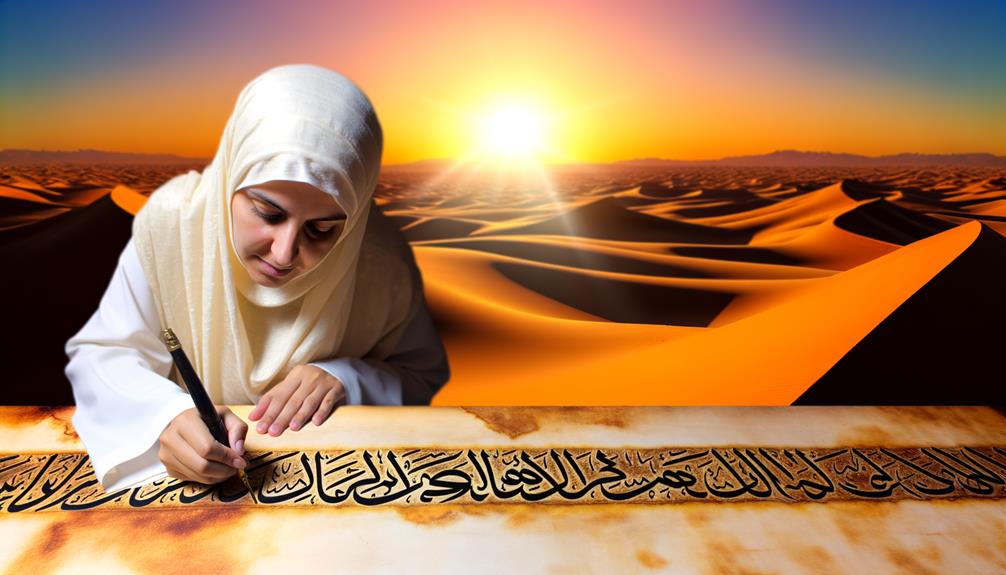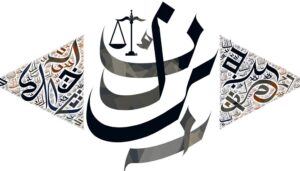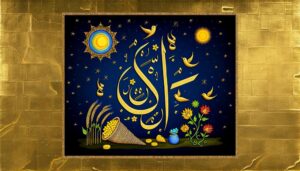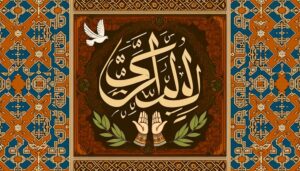Hajra Name Meaning in Arabic
Your name, Hajra, originates from Arabic and it symbolizes strength, determination, and unwavering faith. Rooted in Islamic tradition, it's derived from the Arabic verb 'hajara', meaning 'to emigrate'.
This connection spots Hajra at a significant junction in Islamic history, embodying virtues of courage, resilience and faith. If you hunger for a deeper understanding, unraveling the layers of cultural relevance and the global popularity of this beautiful name will surely astound you.
There's much more to discover about Hajra's profound significance and its enduring relevance in modern society.

Key Takeaways
- Hajra is an Arabic name, derived from the verb 'hajara', which means 'to emigrate'.
- It symbolizes resilience, faith, and sacrifice in Islamic tradition.
- Hajra is deeply connected to Islamic history, notably referring to Prophet Ismail's mother.
- The name represents virtues like courage, strength, and unwavering faith.
- Variations of Hajra include Hajar in Arabic, reflecting the same essence and meaning.
The Origin of Hajra
Diving into the rich tapestry of Arabic nomenclature, you'll find that the name Hajra originates from Islamic tradition, specifically linked to the mother of Prophet Ismail, who's highly respected in the Muslim community. This name carries heavy historical significance, marking the journey of Hajra in search of water for her son in the desert, which is commemorated during the Islamic pilgrimage, Hajj.
Hajra, as a result, isn't just a name. It symbolizes resilience, faith, and sacrifice, qualities that are deeply admired and revered in Islamic culture. Parents often name their daughters Hajra in hopes that they embody these characteristics.
Understanding the profound roots of Hajra, you'll appreciate its deep connection with Islamic history and values.
Linguistic Analysis of Hajra
You're now going to explore the linguistic aspects of the name Hajra.
We'll start by tracing its origins and historical development, before interpreting its literal and contextual meanings.
"Hajra": Origins & History
Often disregarded, the name Hajra carries a rich linguistic heritage that traces its origins back to Arabic roots. You'll find this name commonly used in Arabic-speaking countries, and it's significant in Islamic history as the name of Prophet Ibrahim's second wife.
Delving into its etymology, Hajra stems from the Arabic verb 'hajara' which means 'to emigrate' or 'to leave'. This connotation reflects the pivotal story of Hajra's migration in Islamic tradition.
While the use of Hajra has spread to regions influenced by Arabic and Islamic culture, its core roots remain firmly in the Arabic language. Understanding the linguistic origins and historical context of Hajra helps you appreciate the depth and significance this name holds.
This exploration is an invitation to esteem the weight of names and their historical narratives.
Interpretation of Hajra
Now let's explore a close linguistic analysis of the name Hajra, which promises to uncover even more layers of its rich historical and cultural significance.
In Arabic, 'Hajra' is derived from the root word 'Hajr', meaning 'to migrate' or 'to abandon'. This is a significant concept in Islamic history, symbolizing the Prophet Muhammad's migration from Mecca to Medina.
The name Hajra also carries the connotation of 'determination' and 'strength', characteristics embodied by Hajra, the wife of Prophet Abraham in Islamic tradition. The name's phonetic structure, with a strong, assertive 'h' and 'j', reinforces these meanings.
This linguistic analysis reveals why Hajra is a powerful, meaningful name in Arabic culture. It's not just a name; it's a story of resilience and faith.
Hajra's Cultural Significance
Building on the linguistic roots of Hajra, the cultural significance of this name in Arabic society is vast and profound. Hajra resonates with courage, strength, and resilience, attributes often linked to the Islamic historical figure Hajra (Hagar in English), who's renowned for her brave journey in the desert.
This name isn't only a tribute to her perseverance but also serves as a constant reminder of unwavering faith and determination. It's frequently chosen by parents who want their daughters to embody these virtues.
Additionally, as a common name in various Arabic-speaking countries like Saudi Arabia, Egypt, and UAE, Hajra also represents a sense of shared identity and cultural unity. Thus, the name Hajra carries deep-rooted cultural, religious, and socio-emotional significance in Arabic society.
Hajra's Meaning in Arabic
Let's now turn our attention to the specific meaning of 'Hajra' in Arabic.
We'll explore its origin, ponder its cultural significance, and examine its usage in modern times.
You'll find that each aspect adds a layer of depth to our understanding of this unique name.
Origin of Hajra
Delving into the origins of the name Hajra, it's critical to understand that it holds significant importance in Arabic culture. Hajra is a feminine name mainly used by Muslims.
It's derived from the Arabic root word 'Hajr' which means 'to migrate' or 'to forsake'. This meaning alludes to the story of Prophet Ibrahim's wife, Hajra, who valiantly set out on a migration journey for the sake of her faith.
It's worth noting that the name is also spelled as Hajar in some regions, showcasing the linguistic diversity within the Arabic-speaking community.
You'll find that the name Hajra isn't just a name, it's a tribute to strength, faith, and resilience, deeply rooted in Islamic history and carried with pride by those who bear it.
Hajra's Cultural Significance
Understanding the cultural significance of the name Hajra in Arabic society, you'll soon realize it's more than just a name; it's a symbol of unwavering faith, sacrifice, and resilience.
The name is derived from the Arabic word 'Hijrah,' which signifies migration. It's a reference to the Prophet Muhammad's migration from Mecca to Medina, a pivotal event in Islamic history. But it's also closely tied to Hajra, the wife of Prophet Abraham, who's revered for her sacrifices and perseverance. Her story resonates with the themes of faith, survival, and motherhood.
Over centuries, Hajra has emerged as a beloved name in Arabic and Islamic cultures, embodying strength, faith, and courage. It's a name that's carried with pride and respect, encapsulating a rich tapestry of cultural and religious significance.
Hajra in Modern Usage
While the cultural and historical aspects of the name Hajra are deeply revered, its use in contemporary Arabic society still holds significant meaning. Today, it's seen as a symbol of resilience and strength, mirroring the attributes of Hajra, the revered matriarch from Islamic tradition.
Modern Arabic families often name their daughters Hajra, hoping to instill these virtues in them. In addition, in literary circles and popular culture, Hajra is often used to depict strong, resilient female characters. It's also frequently encountered in Arabic poetry and songs, where it symbolizes sacrifice, courage, and determination.
This not only underscores Hajra's enduring cultural relevance but also reveals how deeply ingrained it's in the modern Arabic lexicon.
Significance of the Name Hajra
In the world of Arabic names, Hajra holds a special significance, as it's believed to symbolize determination and resilience. This compelling name, often used in Middle Eastern cultures, carries with it a powerful message.
When you choose Hajra for your child, you're imbuing them with the spirit of perseverance and the will to overcome obstacles. The essence of the name is rooted in strength and courage, depicting someone who doesn't easily give up.
Hajra in Islamic History
You mightn't know that Hajra, beyond its symbolic meaning, has deep roots in Islamic history, marking the resilience and strength of a significant figure in the Islamic tradition. Hajra was the wife of Prophet Ibrahim and the mother of Prophet Ismail. Her story is one of immense faith and determination.
When Prophet Ibrahim left her and her infant son in the barren desert of Mecca, she didn't lose hope. Instead, she ran between the hills of Safa and Marwa seven times, searching for water. This act, remembered and respected during the Hajj pilgrimage, symbolizes her unwavering trust in God.
Therefore, the name Hajra isn't just a name, but a tribute to indomitable faith and courage in Islamic history.
Common Variations of Hajra
Just as Hajra's story has many layers, so too does the name itself, with several variations across different cultures and languages.
You'll find it spelled as Hagar in English, reflecting the Hebrew origin of the name.
In Arabic, it's commonly written as Hajar, carrying the same meaning of 'flight'.
In Turkish, the variation Hacer is used, while in Persian, it's rendered as Hajar.
The Bosnian variant is Haja.
Despite these differences in spelling, they all bear the same essence and meaning, a confirmation to the name's richness and cultural versatility.
Understanding these variations not only broadens your perspective of the name Hajra, but also deepens your appreciation for its universal appeal.
Popularity and Distribution of Hajra
While it's hard to pin down exact numbers, the name Hajra has seen a significant distribution across various regions globally. You'll find a considerable presence in Arabic-speaking countries, where it's appreciated for its deep, spiritual connotations.
However, don't think it's confined there. Hajra has transcended borders and made its way to South Asian countries like Pakistan, Bangladesh, and India. It's also found in Western nations, thanks to the diaspora communities. Its popularity stems from its inherent beauty and profound meaning.
You'll notice it's frequently chosen by Muslims, due to its Quranic origin. Yet, it's not exclusive to them. Many non-Muslims are embracing Hajra, appreciating its unique sound and rich cultural history.
Conclusion
So, you've journeyed into the depths of the name Hajra, discovered its roots, and have seen its profound meaning in Arabic.
Like a pearl formed over centuries in an oyster, the name Hajra carries history, significance, and deep-rooted beauty.
Whether you're a Hajra, know a Hajra, or simply stumbled upon this article, you've now gained a treasure trove of knowledge about this wonderful name.
And remember, names are more than labels – they're stories, wrapped in history, waiting to be unfolded.






